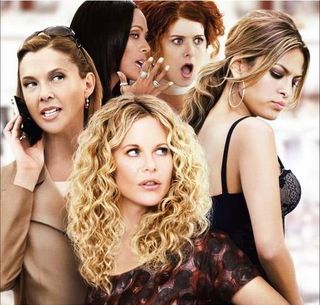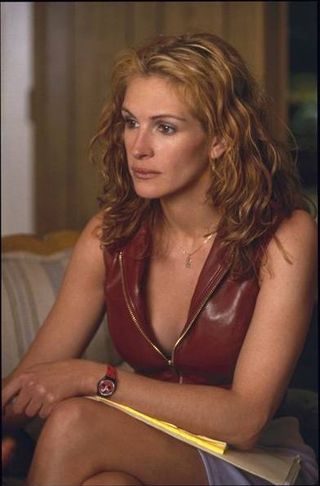A few weeks ago I watched some films on a Saturday night and promised you, the reader, my thoughts on The Women. But you know what I'm like, a flibbertygibbet a will o' the wisp a clown, I never got round to it.
Last night, I watched Erin Brokovich. I looked at the listings of available TV, and thought - I don't actually remember watching Erin Brokovich, so it can't be that good. I then thought, well, there's nothing else on, and I am feeling listless and demotivated, I might as well watch it and craft a blog post on how forgettable it is. After a couple of minutes, I realised I had never actually seen it.
So, eschewing all thoughts of being trendy and cutting-edge I bring you a review of a ten year old film! Still, it could be worse, I realised far too late that Some Like It Hot was being shown, and that's over 50 years old!
What I liked about Erin Brokovich is that it contains a real story. By that, I don't particularly refer to the fact that it's based on a real person fighting a real legal case, but that it takes place in the world outside the inner life of the character.
It wasn't until I read up about The Women after seeing it that I realised that it contained no men whatsoever. I find it sad that in 2008, this is what counts as female autonomy. I know it's based on a 1939 film; I also recognise that it is potentially an interesting device.
 Unfortunately, I found a lot lacking in the film. Not least the absence of any real story. Sure, there was a linear narrative. I just found it so vain and self-absorbed. These women, supposedly intelligent, educated, high-achieving, were interested only in their relationships and in fashion. Making one of the peripheral characters lesbian didn't do much to diminish the notion that women should be defined purely by who their men are and what they wear.
Unfortunately, I found a lot lacking in the film. Not least the absence of any real story. Sure, there was a linear narrative. I just found it so vain and self-absorbed. These women, supposedly intelligent, educated, high-achieving, were interested only in their relationships and in fashion. Making one of the peripheral characters lesbian didn't do much to diminish the notion that women should be defined purely by who their men are and what they wear.
Sure, the Meg Ryan character finally found fulfilment away from the husband, by magically setting up her own business which was an overnight success thanks to her fashion products being bought by Sacs of Fifth Avenue, who, clunkily awkwardly, obviously paid a lot of money for frequent name checks and product placement.
There were several sub-texts and asides that no doubt were supposed to show just how 'pro-women' the film makers were - the daughter with body-image problems, for example. But the underlying theme was unashamedly misogynist: Annette Bening's character, a magazine editor, was a cold-hearted bitch until she was relieved of her job, because we don't want to give women the idea they can succeed at a job, let alone a career. Meg Ryan's business succeeded because it was funded by inherited money. Inherited from her mother, yes, but I think we can be pretty clear that Mother inherited it from a man.
There was no sense of struggle in setting up the business. It was all so effortless, and, in the end, the only work it involved was the the staging of a fashion show: no sales or marketing, no budgets, no manufacturing crises. Just fluffy make-believe land
I will freely admit that I enjoyed watching it: the sets were well chosen and well-filmed, the dialogue was crisp and sharp, and all actors succeeded in credible portrayals of their characters. But there was no substance to the characters, and the plot was wafer thin, coming back time and again to the notion that women only have value as clothes-horses and appendages to (successful, rich) men.
 Erin Brokovich in contrast seems a product of an earlier age. Although bearing little similarity to my own life, it nevertheless reminds me of the lives of countless women I know and have met over the years (minus the $2 million bonus cheque, of course!).
Erin Brokovich in contrast seems a product of an earlier age. Although bearing little similarity to my own life, it nevertheless reminds me of the lives of countless women I know and have met over the years (minus the $2 million bonus cheque, of course!).
What resonated was that she was torn between her job and her family. No homespun homilies implying that women are better off as homemakers, or running guilt trips past women who apply themselves to a job, just an acknowledgement that many women, especially lone mothers, are constantly having to juggle the twin responsibilities. There are no easy answers, life isn't easy, it's just real.
Clothes and men weren't avoided as such. Erin dressed inappropriately for a law office, even by California standards. And her love life was turbulent. But these were not the matters that defined her. They were just aspects of fully-rounded character.
I liked that she was no paragon of virtue and warmed to the impetuosity, the ill-judged rudeness. I also liked the fact that she used her 'feminity' where necessary, not least in winning the confidence of the ordinary people involved in the law-suits. She had a natural empathy for the impact on ordinary people of the disastrous hexavalent chromium in the water supply. Yet this wasn't bludgeoned into the plot with big signs saying 'Look if you employ women you benefit from feminine attributes and your business advances!'
I struggle to remember how I thought back in 2000, but I am fairly certain that I would have considered Erin Brokovich as being a fairly unremarkable portrayal of women, a good but not perfect role model for young women.
Fast forward eight years and Hollywood is implying that the only women who matter are ones who conspicuously consume whilst nothing actually goes on in their heads.
I'm sure there's supposed to be some big message there: Women Don't Want to Be Pressurised Into Working. Well, I guess not. I think most men don't either, but sometime we have to grow up and realise that for most of us, paid work is the only option.
Sure, for many women, and some men, there are good reasons to take time out of the workplace for child-rearing, but this is sustainable for very few of the entire 50 years that constitute 'working life'. Not least, the absence of of social contact and 'status' soon becomes difficult for many people.
I've got nothing against the occasional film that serves as pure escapism, but the production-line of shallow flicks peddling the message that women shouldn't have opinions, shouldn't campaign or hold down jobs, that women shouldn't bother their heads with matters in the wide-world, that nothing matters other than your emotional life and your manicure, well, it's depressing and insulting, and ultimately insidiously quite nasty.
Bored and listless on Saturday evening I proposed we watched a film. The free-at-source channels, terrestrial and satellite, offered very little we hadn't seen and could both watch together, so I chose Blitz. I probably wouldn't have chosen it to watch by myself but the premise seemed reasonable. a cop on the trail of a serial killer.

Comments